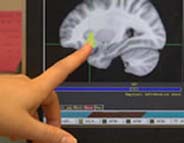 |
 |
|||||||
| July 9, 2013 | Research Extras Researchers have started moving into labs in the new Health Sciences Research Building on Haygood Drive. Research in the 200,000-sq.-ft. building will focus on drug discovery, immunology and vaccines, neurosciences, cancer, gastroenterology, nephrology, biomedical engineering, and human genetics, with nearly 60 percent of research related to pediatrics through a partnership with Children's Healthcare of Atlanta. An article in Emory's Academic Exchange by David Stephens, vice president for research in the WHSC, describes the impact of sequestration on the research, teaching, and patient care missions at Emory, other academic instituions, and the nation as a whole. An Emory Magazine article highlights investments by the Marcus Foundation, creating the Marcus Society in Pediatrics, a partnership of faculty experts and the "intellectual home" for 15 Marcus Professors in Pediatrics. Emory's School of Nursing and the Atlanta VA Medical Center received $4 million to train nurses for the specialized field of veterans health care.
|
|||||||
DRIVE links academic drug discovery to business ventures |
||||||||
Brain scans may help predict best depression treatment |
||||||||
 |
||||||||
VA obesity study shows lifestyle change can work in a large health care system |
||||||||
Study links PTSD and cardiovascular disease |
||||||||
New AIDSVu maps give detailed view of HIV impact in the United States |
||||||||
 |
 |
|||||||



